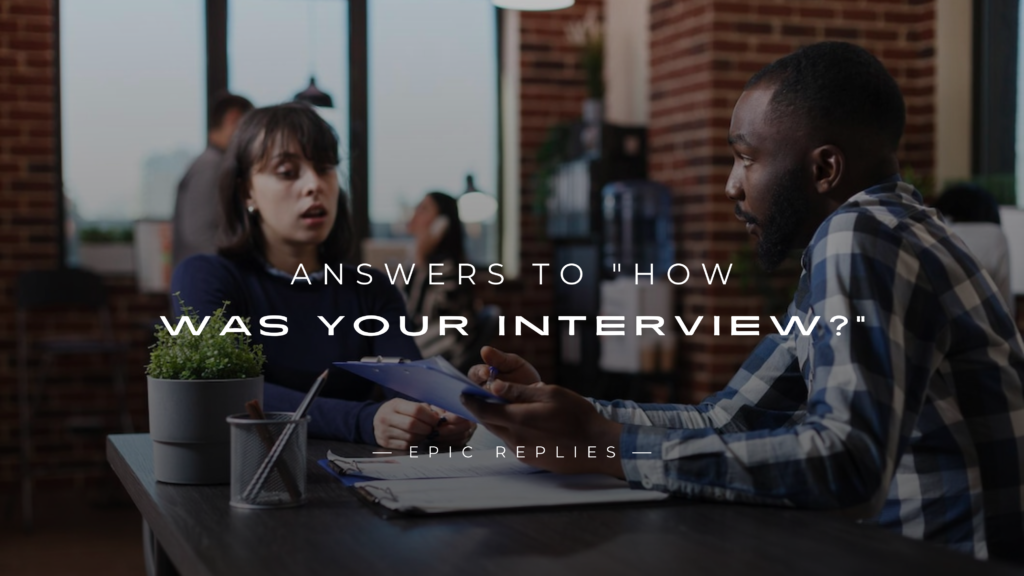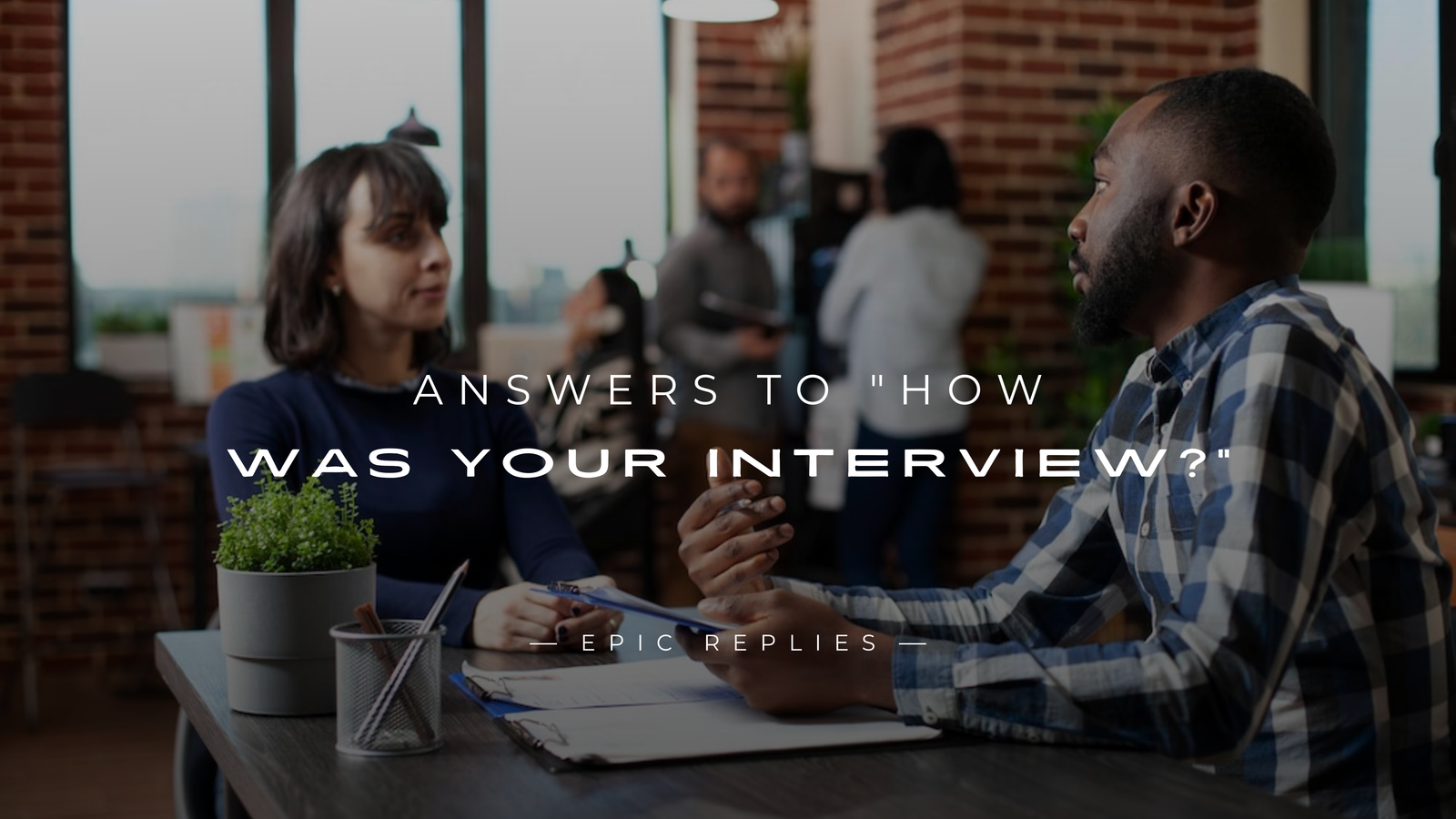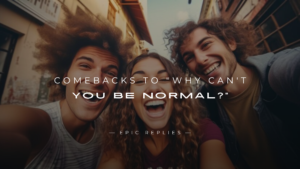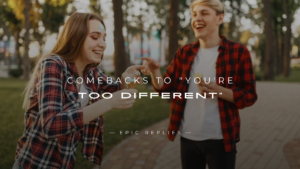Whether it’s your best friend, a coworker, or even a recruiter asking you, the moment someone says “How was your interview?”, your brain might freeze up. Do you tell them the truth? Do you pretend it went great? Do you just say it was fine and move on?
This question, though seemingly simple, carries weight. It is more than just small talk. It is an opportunity. How you respond can reflect your self-awareness, emotional intelligence, and communication style. In fact, how you talk about your interview experience can say just as much about you as the interview itself.
In this article, we will walk through step by step how to respond confidently and appropriately, whether your interview was a smashing success, a total flop, or somewhere in between. We will also look at how to adapt your response depending on who is asking, and why giving a thoughtful answer can actually help you stand out as a professional.

250+ Answers To “How Was Your Interview?”
Nailed It
- I couldn’t have asked for it to go any better.
- Honestly, I feel like I crushed it.
- Every question they asked, I had a solid response ready.
- It just flowed felt like a conversation more than an interview.
- I was in the zone the whole time.
- Walked out feeling confident and proud of how I did.
- It felt like they were really impressed.
- I hit all the points I wanted to make.
- I gave them exactly what they were looking for.
- I think I left a strong impression.
Good Vibes
- The energy was really positive throughout.
- I connected well with the interviewers.
- They made me feel comfortable right away.
- We were laughing at points it felt relaxed.
- It didn’t feel stiff or overly formal, which I liked.
- The conversation just clicked.
- They seemed genuinely interested in what I had to say.
- I could actually see myself working with them.
- Everyone was kind and engaged.
- It was one of those interviews where you walk away smiling.
Better Than Expected
- I was nervous going in, but it went way better than I thought.
- I thought it’d be tough, but it ended up being pretty smooth.
- I surprised myself with how well I answered everything.
- The vibe was more relaxed than I imagined.
- Honestly, I expected it to be a grind but it wasn’t.
- I wasn’t sure what to expect, but they made it easy.
- It turned out to be more of a dialogue than a test.
- I walked out thinking, “That went better than I imagined.”
- Even the tricky questions didn’t throw me off like I feared.
- I left feeling encouraged more than I thought I would.
Well-Prepared
- All the prep I did really paid off.
- I anticipated most of the questions they asked.
- I went in with examples ready and used almost all of them.
- I had my resume story nailed down and it showed.
- I think they appreciated how clearly I explained things.
- My responses were tight and on point.
- I studied the company beforehand and brought it up naturally.
- I had solid answers without rambling.
- It was clear I’d done my homework.
- Preparation gave me confidence the whole way through.
Smooth Process
- Everything ran on time and the structure was clear.
- It felt organized from the start.
- The flow from one topic to the next made sense.
- I knew what to expect, and that helped.
- The questions built naturally on each other.
- No surprises it was straightforward and professional.
- The pacing was perfect not rushed or dragged out.
- Instructions and expectations were communicated clearly.
- It was one of the more seamless interviews I’ve had.
- I appreciated how efficient it all felt.
Immediate Feedback
- They told me right there that I’d done a great job.
- I got a verbal “impressive” after one of my answers.
- They nodded and smiled a lot, which felt reassuring.
- One of them said, “You’re exactly what we’re looking for.”
- They asked if I’d be available for the next round.
- I could tell they were happy with what they heard.
- At the end, they said I’d hear back very soon in a good tone.
- They mentioned liking my take on a tough question.
- They were enthusiastic in their body language.
- I left with a strong sense that they were pleased.
Hard to Read
- I honestly couldn’t tell how it went.
- They were pretty neutral the whole time.
- I wish I had more of a read on them.
- Not much facial expression or response.
- I’m not sure if they liked my answers or not.
- They kept it very professional, but not expressive.
- It was tough to gauge whether they were engaged.
- They gave little reaction either way.
- I left unsure of what they thought.
- No clues could go either way.
Okay, I Guess
- It was alright not amazing, not terrible.
- I did okay, I think.
- Nothing really stood out, but I didn’t bomb it either.
- I answered most things decently, I’d say.
- Not my best, but I held my own.
- I wasn’t super inspired, but it was fine.
- I’m not thrilled, but not disappointed either.
- A very average experience overall.
- It didn’t leave much of a lasting impression.
- I’m neutral about the whole thing.
Mixed Signals
- Some parts felt great, others not so much.
- One interviewer seemed into it, another not so much.
- I felt confident halfway through, then it dipped.
- I nailed some questions, but stumbled on a few.
- The vibe kept shifting it was hard to stay steady.
- They laughed at one answer, but seemed cold at another.
- I walked out confused it wasn’t consistent.
- Got praise at one point, then total silence later.
- I think I clicked with one person but not the rest.
- Honestly, it felt like a rollercoaster.
Could Have Been Better
- I wasn’t as sharp as I wanted to be.
- A few questions caught me off guard.
- I fumbled through an example that I usually handle well.
- I lost my train of thought at one point.
- I wish I had phrased a few things differently.
- It wasn’t a disaster, but it wasn’t my best.
- I think nerves got to me a bit.
- I blanked on something I knew.
- I didn’t leave feeling super confident.
- I’m hoping they saw potential, even if it wasn’t perfect.
Uncertain Fit
- I’m not sure I’d thrive in that kind of environment.
- The team dynamic didn’t quite click with me.
- I have some concerns about the role itself.
- It’s a good opportunity, but maybe not the right one for me.
- Something felt a little off I can’t explain it.
- I’m still trying to figure out if this is my kind of place.
- It might be a better fit for someone else.
- I didn’t feel super excited after the conversation.
- I’m on the fence it’s not a clear yes or no.
- It wasn’t bad, but I’m not convinced it’s the right move.
Technical But Fair
- The questions were tough but reasonable.
- It definitely tested my skills, but I felt prepared.
- I had to think on my feet, but nothing felt unfair.
- They really focused on the technical stuff, which I expected.
- I appreciated that they pushed me but didn’t try to trip me up.
- I had to walk through some complex problems, but I handled them.
- The challenge was real, but it was a good challenge.
- It wasn’t easy, but it made sense given the role.
- They gave time to explain my approach, which helped.
- I left thinking, that was tough, but I held my own.
Tough Crowd
- They weren’t giving much away at all.
- I felt like I had to pull the energy out of the room.
- No one cracked a smile the whole time.
- It was hard to tell if they were even interested.
- I did my best, but they were hard to engage.
- It felt cold, honestly.
- I tried to stay upbeat, but it wasn’t easy.
- They kept a strict poker face.
- I didn’t feel much warmth or connection.
- I’m not sure if it was me or just their style.
Curveballs Thrown
- They asked a question I’d never even considered.
- I got a scenario that really threw me off.
- One of the questions felt totally out of left field.
- They hit me with a “what if” that I had to really think through.
- I had to improvise more than I expected.
- Definitely a few surprises in there.
- I think they were testing how I think under pressure.
- They asked something I hadn’t prepared for at all.
- It wasn’t your standard interview, that’s for sure.
- I had to stay calm and just roll with it.
Fumbled Some Answers
- I blanked on one question I normally know cold.
- I definitely stumbled through a couple of answers.
- I started rambling and then lost my point.
- I wish I’d explained that one answer more clearly.
- I misread one question and gave the wrong kind of response.
- I was kicking myself after a few of those answers.
- It just didn’t come out the way I meant it to.
- I gave a so-so answer to a really important question.
- I got nervous and my brain kind of froze for a second.
- It wasn’t a disaster, but I know I could’ve done better.
Time Management Issues
- I ran out of time before I could finish my last answer.
- I spent too long on one question and had to rush the rest.
- The clock kind of got away from me.
- I wish I had paced myself better.
- I got cut off mid-answer at one point.
- I didn’t leave enough time to ask my own questions.
- I realized too late that I needed to speed up.
- I felt rushed toward the end.
- I over-explained a couple of things and it cost me time.
- The interview ended before I could make my final points.
Bad Chemistry
- The connection just wasn’t there.
- I didn’t feel like we clicked at all.
- It felt like we were on totally different wavelengths.
- I tried to be friendly, but it didn’t land.
- We just didn’t vibe, plain and simple.
- I got the sense they weren’t that into the conversation.
- It felt forced the whole time.
- The interaction was kind of awkward.
- I couldn’t build any rapport.
- I left thinking, maybe it’s just not a fit personality-wise.
Poor Format
- The structure was all over the place.
- I wasn’t really sure who was leading the conversation.
- It felt like no one knew what the agenda was.
- The interviewers kept talking over each other.
- The questions felt random and disjointed.
- It didn’t feel like a professional setup.
- No clear direction or flow at all.
- There wasn’t enough time allocated for anything.
- They seemed unprepared or distracted.
- Honestly, it just felt messy.
Learning Experience
- Even if it doesn’t work out, I learned a lot.
- It gave me a better sense of what to expect next time.
- I took notes afterward so I can improve.
- It helped me realize where I need to sharpen up.
- I got good insight into how I handle pressure.
- I know what to work on now.
- It helped me better understand what roles suit me.
- I grew just by going through it.
- I saw where I shined and where I need to grow.
- I’m grateful for the experience, even if it wasn’t perfect.
Showed My Growth
- I was proud of how much more confident I felt compared to past interviews.
- I handled a question today that used to trip me up.
- I could tell I’ve come a long way in how I communicate my experience.
- I felt more in control of the conversation than I ever have.
- I was able to talk about my challenges without getting flustered.
- I didn’t overthink everything like I used to.
- I stayed calm and clear, even when things got tricky.
- I think I really showed how much I’ve evolved professionally.
- I could tell I wasn’t the same candidate I was a year ago.
- It felt like a real step forward in how I present myself.
Refining My Pitch
- I tweaked the way I introduce myself and it landed better.
- I finally nailed how to talk about that career gap.
- I’m getting better at tying my experience to what they’re looking for.
- My story is starting to feel more cohesive.
- I experimented with a new way of explaining my transition, and it worked.
- I practiced some new phrasing and it flowed well.
- My pitch was tighter than it’s ever been.
- I tried a new way to frame my strengths, and it clicked.
- I adjusted my answers from my last interview and it showed.
- I’m starting to really own my narrative.
Now I Know the Role
- The interview helped me understand what the role actually involves.
- I walked away with a much clearer picture of the day-to-day work.
- I didn’t realize how cross-functional the role is until they explained it.
- I got a sense of the real expectations, not just what was on the job posting.
- Now I can tell if this position really matches my skills.
- They were transparent about the role’s challenges, which helped.
- I learned who the role reports to and what success looks like there.
- I finally get what kind of problems they want this role to solve.
- They explained the role’s long-term vision really well.
- The conversation gave me the context I was missing.
Good Practice
- Even if I don’t get it, I’m glad I did it.
- It was a great chance to sharpen my interview skills.
- I see where I can improve next time.
- It was solid practice for future opportunities.
- I tested some answers I’ve been working on.
- I’m using each interview as a way to get better.
- Every time I interview, I get a little more confident.
- It helped me spot weak spots I can work on.
- I feel more comfortable with the process now.
- It’s all building toward something better.
Got Follow-Up
- They emailed me the next steps within hours.
- I already got an invite for the second round.
- They said they’ll be scheduling me with the hiring manager next.
- I got feedback right after the interview ended.
- They sent a calendar link for a follow-up before I even got home.
- The recruiter let me know they want to move forward.
- I’m on to the next phase, which is a good sign.
- They mentioned looping in more of the team soon.
- I got a thank-you and a timeline for what’s next.
- Looks like I’m progressing to the next step.
Got the Offer!
- I just heard back they made an offer!
- They called and said they’d love to have me on board.
- I got the job!
- Offer came through and the terms look solid.
- I received the official letter this morning.
- They want to move forward with me as their top choice.
- After all the rounds, they made it official.
- I’m thrilled I accepted the offer!
- It’s real now, I’ve got the offer in writing.
- I did it I landed the position.
Why People Ask “How Was Your Interview”
- Understanding Intent Behind the Question
When someone asks how your interview went, they are not just looking for a yes or no answer. They are trying to get a sense of your mindset, your confidence level, and even how you process feedback.
The question is often a mix of genuine curiosity and emotional support. Friends and family ask because they care about you and want to know how you are doing. Colleagues may ask out of casual interest or even professional curiosity. Recruiters might ask because they are gauging how to assist you next.
Understanding who is asking and why makes all the difference in how you should respond.
Who Might Be Asking and How to Tailor Your Answer
- When a Friend or Family Member Asks
These are the people who have likely been cheering you on from the start. They want to know how you feel, not just how you performed. Keep your tone relaxed and conversational.
Example response:
“It went better than I expected. The interviewer asked some thoughtful questions, and I felt like I was able to connect my experience to what they were looking for.”
- When a Coworker Asks
This situation calls for a bit more caution. Office dynamics can be tricky, and oversharing might backfire. Keep it neutral, positive, and professional.
Example response:
“I thought it went pretty well. It was a great opportunity to talk about my experience and learn more about what the company is focused on.”
- When a Recruiter or Career Coach Asks
Here, your answer needs to strike a balance between honest self-reflection and professional clarity. Use it as a chance to show your analytical thinking and awareness.
Example response:
“I think it went well. There were a few curveball questions, but I was able to tie my responses back to the role and the company’s goals. I felt like the conversation was engaging and constructive.”
What Makes a Great Answer
- Confidence Without Arrogance
Sounding overly confident can be just as off-putting as sounding unsure. Your answer should reflect assurance in your abilities without coming across as boastful.
- Specific But Not Oversharing
You do not need to walk through every question you were asked. Mention one or two key takeaways or impressions, and then leave it at that.
- Positive Framing
Even if the interview went poorly, find a positive angle. This is not about being fake. It is about demonstrating resilience and maturity.
Semantic Variations You Can Use
Using natural variations of the main keyword “How was your interview” helps you sound more human and boosts SEO if you’re writing or posting about it.
Try phrases like:
- How did the interview go
- What was the interview like
- How do you feel about the interview
- Did the interview meet your expectations
- What was your experience in the interview
Using different phrasings makes your response more organic and keeps the conversation flowing.
Examples Based on How the Interview Actually Went
If the Interview Was Excellent
You are excited, confident, and hopeful. Your body language shows it, and now your words should reflect it too.
- Response example:
“It went really well. The conversation felt natural, and I connected with the interviewer’s perspective. I left feeling like it’s a role I would thrive in.”
If the Interview Was Just Okay
Not bad, not amazing. Maybe you had a few hiccups, but overall it felt balanced.
- Response example:
“It was decent. There were a couple of tough questions, but I think I handled them okay. I got a better understanding of the company, which helped clarify if it’s the right fit for me.”
If the Interview Was Disappointing
You might be feeling frustrated, but this is where self-awareness and tact matter most.
- Response example:
“It was challenging. There were a few things I didn’t expect, but I learned a lot about how I can improve for next time. It definitely helped me see where I can grow.”
This kind of response communicates that you are not shaken by setbacks and that you are committed to self-improvement.
Using Emotional Intelligence in Your Answer
- Read the Room
Before answering, consider the context. Are you at a networking event? Chatting with friends? In a meeting? Your tone and length should match the setting.
- Mirror Their Energy
If the person asking is upbeat and curious, feel free to share a bit more. If they seem distracted or rushed, keep it brief and to the point.
Why Your Tone Matters
How you say something matters just as much as what you say. A confident tone makes your answer sound assured. A hesitant tone can undermine your words.
Speak clearly. Smile if appropriate. And avoid filler words like “um” and “I guess” that weaken your message.
What Not to Say
Avoid responses like:
- “I have no idea. Maybe it was good?”
- “The interviewer was kind of rude.”
- “I think I messed everything up.”
- “They asked dumb questions.”
These types of answers can make you seem emotionally reactive or unprofessional. Even if your emotions are valid, find a way to express them with tact.
Turning the Conversation Into a Networking Opportunity
If someone from your professional circle asks how it went, this is your moment to build rapport.
Example:
“It was a valuable learning experience. The way they structured their team was really interesting. Have you ever worked in an environment like that?”
This approach turns your answer into a dialogue and keeps the connection going.
Using the STAR Method to Summarize Your Interview
If you want to talk about a specific moment from your interview, the STAR method (Situation, Task, Action, Result) can help you explain clearly and succinctly.
Example:
“There was a moment where they asked about handling a sudden project delay. I shared how I once had to rework a project timeline due to client-side issues, and I explained how I got the team back on track. They seemed to like that example.”
This shows problem-solving, initiative, and clear communication.
Practicing Your Answer Ahead of Time
Just like practicing for the interview itself, it helps to rehearse your post-interview response.
Try this exercise:
- Write down a few sentence-long summaries of how you felt the interview went
- Record yourself saying them out loud
- Get feedback from someone you trust on how your tone and message come across
With practice, your answer will feel natural and confident.
What if You Do Not Want to Talk About the Interview
That is okay too. You are not obligated to discuss it. Just be polite and firm.
Example:
“Thanks for asking. I’m still processing it, but I’ll let you know how things go.”
This sets a boundary without sounding dismissive.
Conclusion
Navigating post-interview conversations can be just as crucial as the interview itself. Whether you’re sharing your experience with a friend, mentor, or hiring manager, having the right words ready makes all the difference. We hope these 250+ perfect answers help you respond confidently, no matter how your interview went. And if you want to level up your social communication even further, check out these 250+ Smart & Memorable Replies To “Good Luck” Wishes they’re just as useful in both personal and professional settings.
FAQs
Q. How should I answer if I have multiple interviews lined up?
Say something like, “It went well, and I’m looking forward to the other interviews I’ve scheduled. I’m keeping an open mind until I’ve met with all the teams.”
Q. Is it okay to say I am unsure how it went?
Yes, just phrase it positively. Try saying, “There were some strong parts and some I’d approach differently next time, but I feel good about the overall effort.”
Q. What if someone asks in a group setting and I do not want to share?
You can politely smile and say, “I’ll tell you more later, still gathering my thoughts on it.” It buys you time and avoids pressure.
Q. Can I say I think I nailed it?
Confidence is great, but avoid sounding too sure. Try, “I felt really confident walking out. I think it aligned well with my background.”
Q. Should I mention if I followed up after the interview?
Only if it fits naturally into the conversation. Example: “I felt good about the interview and sent a thank-you note right after. Just waiting to hear back.”




